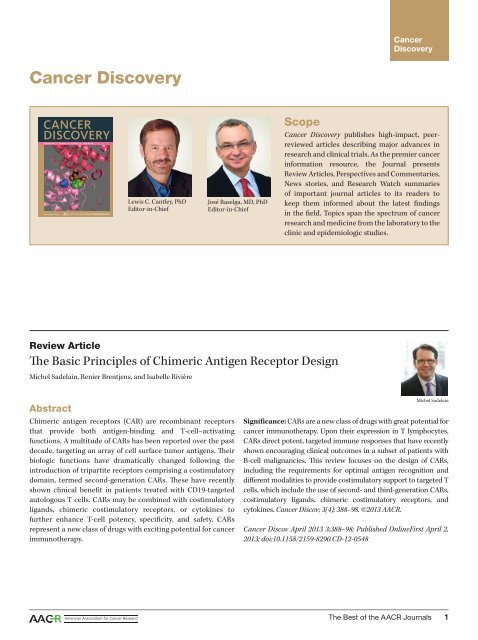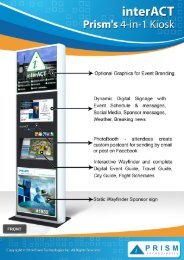Best of AACR Journals
You also want an ePaper? Increase the reach of your titles
YUMPU automatically turns print PDFs into web optimized ePapers that Google loves.
Cancer<br />
Cancer Discovery Discovery<br />
Cancer Discovery<br />
CANCER<br />
DISCOVERY<br />
FEBRUARY<br />
www.aacrjournals.org<br />
Lewis C. Cantley, PhD<br />
Editor-in-Chief<br />
José Baselga, MD, PhD<br />
Editor-in-Chief<br />
Scope<br />
Cancer Discovery publishes high-impact, peerreviewed<br />
articles describing major advances in<br />
research and clinical trials. As the premier cancer<br />
information resource, the Journal presents<br />
Review Articles, Perspectives and Commentaries,<br />
News stories, and Research Watch summaries<br />
<strong>of</strong> important journal articles to its readers to<br />
keep them informed about the latest findings<br />
in the field. Topics span the spectrum <strong>of</strong> cancer<br />
research and medicine from the laboratory to the<br />
clinic and epidemiologic studies.<br />
Review Article<br />
The Basic Principles <strong>of</strong> Chimeric Antigen Receptor Design<br />
Michel Sadelain, Renier Brentjens, and Isabelle Rivière<br />
Abstract<br />
Chimeric antigen receptors (CAR) are recombinant receptors<br />
that provide both antigen-binding and T-cell–activating<br />
functions. A multitude <strong>of</strong> CARs has been reported over the past<br />
decade, targeting an array <strong>of</strong> cell surface tumor antigens. Their<br />
biologic functions have dramatically changed following the<br />
introduction <strong>of</strong> tripartite receptors comprising a costimulatory<br />
domain, termed second-generation CARs. These have recently<br />
shown clinical benefit in patients treated with CD19-targeted<br />
autologous T cells. CARs may be combined with costimulatory<br />
ligands, chimeric costimulatory receptors, or cytokines to<br />
further enhance T-cell potency, specificity, and safety. CARs<br />
represent a new class <strong>of</strong> drugs with exciting potential for cancer<br />
immunotherapy.<br />
Michel Sadelain<br />
Significance: CARs are a new class <strong>of</strong> drugs with great potential for<br />
cancer immunotherapy. Upon their expression in T lymphocytes,<br />
CARs direct potent, targeted immune responses that have recently<br />
shown encouraging clinical outcomes in a subset <strong>of</strong> patients with<br />
B-cell malignancies. This review focuses on the design <strong>of</strong> CARs,<br />
including the requirements for optimal antigen recognition and<br />
different modalities to provide costimulatory support to targeted T<br />
cells, which include the use <strong>of</strong> second- and third-generation CARs,<br />
costimulatory ligands, chimeric costimulatory receptors, and<br />
cytokines. Cancer Discov; 3(4); 388–98. ©2013 <strong>AACR</strong>.<br />
Cancer Discov April 2013 3:388–98; Published OnlineFirst April 2,<br />
2013; doi:10.1158/2159-8290.CD-12-0548<br />
The <strong>Best</strong> <strong>of</strong> the <strong>AACR</strong> <strong>Journals</strong><br />
1



